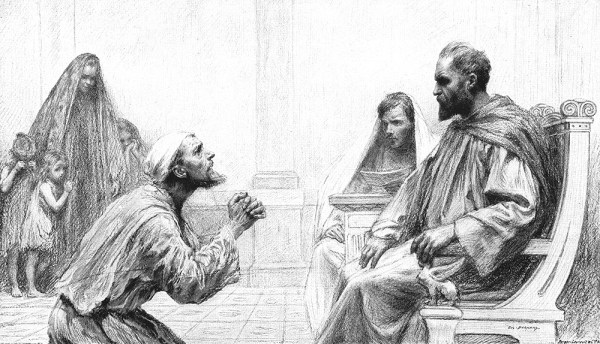Love, Prayer, and Forgiveness: When Basics Become Heresies

140 pp., Now, also in Ebook $3
For NOOK or PC, (Link) For Kindle or PC Smashwords
“…an excellent piece…one that many Christians need to hear”–R.C. Sproul, (February 13, 1939 – December 14, 2017, Soli Deo Gloria)
“The book (is)…an astringent corrective of misinterpreted love.” – Vernon Grounds, late Chancellor, Denver Seminary
“Sometimes really great books are written by unknown authors; this is one of them.”—The Determined Christian
Be Equipped to explain the difference between God’s word and the World’s view.
Your Family and Neighbors Need Someone Who Can Explain to them the Difference.
Be a Disciple, a student of God’s word.
***
How do we harmonize the assurance that “God is love” with the assertion that “Our God is a consuming fire”? Most of us never think about such problems, and in the end our idea of love is indistinguishable from that of the world around us. –Leon Morris
Chesterton wisely did not disconnect the concept of “heresy” from moral teaching and practice.
***
C o n t e n t s
Introduction ……………………………………………………………..11
Chapter One:
Love and Obedience ………………………………………….21
Chapter Two:
Prayer and Exhortation ………………………………………39
Chapter Three:
Forgiveness and Repentance……………………………….63
Chapter Four:
Sin and Silence …………………………………………………91
Chapter Five:
Revival and Holiness ……………………………………….115
[These posts are excerpts from the book: Exhortaton…do right; Heart and Mind; The Love Chapter; Of Ponds and Pitfalls; Repentance and Forgiveness ]
Now, also, available in E Book format for Nook, Kindle, or from Smashwords for 3 dollars.
140 pages
[Note: You do NOT Need a Kindle or Nook. You can read on your PC or Laptop]
Amazon, UK
Amazon
(Go to Amazon or B&N for free ‘look inside’/ ‘Read Sample’ features.)
Barnes and Noble
Smashwords
[Smashwords: Available ebook formats: epub mobi pdf rtf lrf pdb txt html ]
The print edition, here or Barnes&Noble ( Marketplace for UK)
The Short Review: Buy this book!
The Long Review:
My people are destroyed for lack of knowledge . . .cont. at ‘Blogger review’ link
End NOTES to the Book:
Notes to Text
Introduction
1. Chuck Colson, “Promises Without Principle,” Breakpoint, December 2000,
p.12. Available from Prison Fellowship Ministries, Breakpoint Magazine Services,
P.O. Box 1550, Merrifield, VA 22116, or http://www.breakpoint.org or Phone (800) 995-8777.
2. C. S. Lewis, The Screwtape Letters (New York: Macmillan, Paperbacks ed., 1961), pp. 115-16.
3. Barna Research Online, “The Year’s Most Intriguing Findings,” 17 December 2001.
4. Tim Weiner, “US is No. 1,” San Jose Mercury News, 13 March 1991.
5. Online see abortionfacts.com; barna.org, archives, “Church Attendance”; divorcemag.com; guttmacher.org, “Country Abortion Rates”; umich.edu, “1995-1997 World Values Survey.”
6. Pulpit Helps 27, no. 2 (February 2002):1.
7. Thomas Aquinas, Summa Theologica I, 1, 8. Quoted in Donald G. Bloesch, Essentials of Evangelical Theology, vol. 1, God, Authority, and Salvation (San Francisco: Harper & Row, 1978), p. 57.
8. Martin Luther, Martin Luther: Selections from His Writings, ed. John Dillenberger (Garden City, N. Y.: Doubleday, Anchor Books, 1961), p. xxii.
9. Ibid., p. xxiv.
10. Ibid., p. 343.
11. Ibid.
12. Bloesch, Essentials of Evangelical Theology, 1:59.
13. E. J. Carnell, The Case for Biblical Christianity, ed. Ronald H. Nash (Grand Rapids: Eerdmans, 1969), p. 33.
Chapter One
1. Leon Morris, Testaments of Love: A Study of Love in the Bible (Grand Rapids: Eerdmans, 1981), p. 2.
2. e.g. Erich Fromm, Carl Rogers. See Paul Brownback, The Danger of Self-Love, Chicago: Moody, 1982; Paul C. Vitz, Psychology as Religion: The Cult of Self-Worship, Grand Rapids: Eerdmans, 1994.
3. I. Howard Marshall, The Gospel of Luke: A Commentary on the Greek Text (Grand Rapids: Eerdmans, 1978), p. 444.
4. Blaise Pascal, Pensees, no. 100.
5. W. F. Albright and C. S. Mann, Matthew (The Anchor Bible, Garden City, N. Y.:Doubleday, 1979), p. vi.
6. R. Laird Harris, Gleason L. Archer, Jr., and Bruce K. Waltke, eds., Theological Wordbook of the Old Testament, 2 vols. (Chicago:Moody, 1980), 1:466.
7. Colin Brown, ed., The New International Dictionary of New Testament Theology, 3 vols. (Grand Rapids: Zondervan, 1975-78), s.v. “heart.”
8. Charles C. Adams, The Specter of Individualism, “Plumbline” transcript (Sioux Center, Ia.:KDCR radio, 1 May 2000), p. 2.
9. Augustine, Confessions (trans. Pusey) 4. 1.
10. Pascal, Pensees, no. 81.
11. A. W. Tozer, The Root of the Righteous (Camp Hill, Pa.: Christian Publications, 1986), p. 8.
12. Marilyn Hickey, “Ask Marilyn,” Charisma, June 1984, p. 17.
13. Elisabeth Elliot, “Gateway to Joy,” air date 8 February 2001. (Good News Broadcasting Assn. Tapes may be ordered at (800) 759-4569.)
14. Augustine, City of God (trans. Dods) 14. 28.
15. Dietrich Bonhoeffer, Life Together, trans. John W. Doberstein (New York: Harper & Row, 1954), p. 34.
16. Ibid., p. 35.
17. Elton Trueblood, A Place to Stand (New York: Harper & Row, 1969), p. 56.
18. Morris, Testaments of Love, p. 273.
19. F. F. Bruce, The Epistles of John (Grand Rapids: Eerdmans, 1979), p. 53.
20. A. W. Tozer, The Pursuit of God (Harrisburg, Pa.: Christian Publications, 1948), p. 70.
Chapter Two
1. C. S. Lewis, The Screwtape Letters (New York: Macmillan, Paperbacks ed., 1961), p. 20.
[It is a tragic symptom of the unthinking Christians of our day that some would reject this book because of these citations from Mormon literature. These quotes were given as examples of when “Prayer becomes Heresy.”]
2. “The Plan of Our Heavenly Father,” Study Guide 1 (Corp. of the Pres. of the Church of Jesus Christ of Latter-day Saints, 1986), p. 5.
3. History of the Church of Jesus Christ of Latter-day Saints, 8 vols. (Salt Lake City: Deseret Book Co., 1980), 6:305.
4. Deseret News, 14 November 1859.
5. History of the Church of Jesus Christ of Latter-day Saints, 6:306.
6. John Wesley, The Works of John Wesley, 3d ed., 14 vols. (Grand Rapids: Baker Book House, 1979), 1:397.
7. John N. Oswalt, The Book of Isaiah: Chapters 1-39 (NICOT, Grand Rapids: Eerdmans, 1986), pp. 97-98.
8. Chuck Colson, “Triumph of the Therapeutic,” Breakpoint, October 2000, p.17.
9. David F. Wells, Losing Our Virtue: Why the Church Must Recover Its Moral Vision (Grand Rapids and Cambridge: Eerdmans, 1998), p. 4.
10. H. G. Wood, Christianity and Civilization (New York: Macmillan, 1943) p. 61. Quoted in D. Elton Trueblood, Philosophy of Religion (Grand Rapids: Baker Book House, 1973), p. 171.
11. John MacArthur, “The Discipline of God’s Children,” tape GC 2331. Available from Word of Grace Tape Library, P. O. Box 4000, Panorama City, CA 91412.
12. Colin Brown, ed., The New International Dictionary of New Testament Theology, 3 vols. (Grand Rapids: Zondervan, 1975-78), s.v. “exhort.” Henceforth cited as NIDNTT.
13. Charlotte Holt Clinebell, Counseling for Liberation, ed. Howard J. Clinebell, Jr., Creative Pastoral Care and Counseling Series (Philadelphia: Fortress Press, 1976), p. 21.
14. Ibid., p. 31.
15. NIDNTT, s.v. “exhort.”
16. Ibid.
17. Clinton Morrison, An Analytical Concordance to the Revised Standard Version of the New Testament (Philadelphia: Westminster Press, 1979), see index.
18. F. F. Bruce, The Epistle to the Galatians: A Commentary on the Greek Text (Grand Rapids: Eerdmans, 1982), p. 260.
19. John Calvin, Golden Booklet of the Christian Life, trans. Henry J. Van Andel (Grand Rapids: Baker Book House, 1952), p. 11.
20. Ibid., pp. 18-19.
21. Daily Mail, 10 May 1999.
22. Ibid.
23. F. F. Bruce, The Epistles to the Colossians, to Philemon, and to the Ephesians (NICNT, Grand Rapids: Eerdmans, 1984), p. 345.
24. Ibid., p. 348.
25. Ibid.
26. John Woolman, The Journal and Major Essays of John Woolman, ed. Phillips P. Moulton (New York: Oxford University Press, 1971), p. 53.
27. Ibid., p. 95.
28. Ibid., p. 54.
29. Ibid., p. 35.
30. Ibid., p. 33.
31. Thomas A. Bailey, The American Pageant: A History of the Republic, 3d ed., 2 vols. (Boston: D. C. Heath and Co., 1966), 1:73.
32. Woolman, Journal, p. 52.
33. Charles Colson, Breakpoint Newsletter, n.d.
34. United Press International, 12 December 1995.
Chapter Three
1. Geoffrey W. Bromiley, gen. ed., The International Standard Bible Encyclopedia, 4 vols. (Grand Rapids: Eerdmans, 1979-88), s.v. “forgiveness.” Henceforth cited as ISBE.
2. F. F. Bruce, The Book of Acts, rev. ed. (NICNT, Grand Rapids: Eerdmans, 1988), p. 70.
Chapter Three (cont.)
3. J. I. Packer, Concise Theology: A Guide to Historic Christian Beliefs
(Wheaton: Tyndale House, 1993), p. 245.
4. On this verse, F. F. Bruce writes, “Table-fellowship included the Eucharist . . . but was by no means confined to it; it constituted one of the most solemn bonds of brotherhood. Within the Christian community an unwarranted breach of table-fellowship was almost tantamount to a denial of the gospel truth (Gal. 2.11ff.); where it was warranted . . . it was bound to be taken seriously and was calculated to be one of the surest ways of bringing a delinquent church member to acknowledge the error of his ways.” See 1 and 2 Corinthians, NCBC, Grand Rapids: Eerdmans; London: Marshall, Morgan, & Scott, 1980.
5. Frank E. Gaebelein, gen. ed., The Expositor’s Bible Commentary (Grand Rapids: Zondervan, 1981), 12:275.
6. Martin Luther, Martin Luther: Selections from His Writings, ed. John Dillenberger (Garden City, N. Y.: Doubleday, Anchor Books, 1961), p. 72.
7. R. Laird Harris, Gleason L. Archer, Jr., and Bruce K. Waltke, eds., Theological Wordbook of the Old Testament, 2 vols. (Chicago: Moody, 1980), 2:909.
8. Colin Brown, ed., The New International Dictionary of New Testament Theology, 3 vols. (Grand Rapids: Zondervan, 1975-78), s.v. “reconciliation.” Henceforth cited as NIDNTT.
9. ISBE, s.v. “repent.”
10. Leon Morris, The Gospel According to Matthew (Grand Rapids: Eerdmans, 1992), p. 149.
11. The Interlinear Greek-English New Testament, trans. Rev. Dr. Alfred
Chapter Three (cont.)
Marshall (Great Britain: Samuel Bagster & Sons, 1958), p. iii.
12. I. Howard Marshall, The Gospel of Luke: A Commentary on the Greek Text (Grand Rapids: Eerdmans, 1978), p. 867.
13. Christianity Today 45, no.6 (23 April 2001): 28.
14. Victor Parachin, “Letting Go: Ten Guidelines to Help You Forgive,” Journey, March/April 2000, p. 7.
15. Ibid.
16. Becky Beane, “Forgiveness” tract, p. 14. Article originally published by Prison Fellowship Ministries in Jubilee, Spring 1998. Please Note: To be fair to the writer, she does say that “reconciliation . . . requires repentance.” She just does not see the biblical condition of repentance as preceding forgiveness. Like so many, she uses forgiveness more broadly than the Bible does, using it synonymously for fruits like love and mercy.
17. ISBE, s.v. “forgiveness.”
18. C. E. B. Cranfield, A Critical and Exegetical Commentary on The Epistle to the Romans, 2 vols. (ICC, Endinburgh: T. & T. Clark, 1975), 1:256-57.
19. Ibid., 1:267.
20. Ibid., 1:258.
21. Ibid.
22. NIDNTT, s.v. “conversion.”
23. Ibid., s.v. “forgiveness.”
24. Ibid., s.v. “reconciliation.”
25. ISBE, s.v. “reconcile.”
26. Morris, Matthew, p. 116.
27. A. Noordtzij, Leviticus, trans. Raymond Togtman (BSC, Grand Rapids: Zondervan, 1982), p. 199.
28. Marshall, Luke, p. 642.
29. Norval Geldenhuys, Commentary on the Gospel of Luke (NICNT, Grand Rapids: Eerdmans, 1993), p. 432.
30. NIDNTT, s.v. “conversion.”
31. John Wesley, The Works of John Wesley, 3d ed., 14 vols. (Grand Rapids: Baker Book House, 1979), 5:149.
32. Deitrich Bonhoeffer, The Cost of Discipleship, rev. and unabridged ed. (New York: Macmillan, Paperbacks ed., 1963), p. 47.
33. Marshall, Luke, p. 641.
34. Ibid., p. 642.
35. Ibid., p. 643.
36. C. S. Lewis, The Silver Chair (New York: Macmillan Co., 1953), pp. 142-43.
Chapter Four
1. Norval Geldenhuys, Commentary on the Gospel of Luke (NICNT, Grand Rapids: Eerdmans, 1993), p. 402.
2. Ibid., p. 403.
3. I. Howard Marshall, The Gospel of Luke: A Commentary on the Greek Text (Grand Rapids: Eerdmans, 1978), p. 867.
4. John Wesley, The Works of John Wesley, 3d ed., 14 vols. (Grand Rapids: Baker Book House, 1979), 3:12.
5. Martin Luther, Martin Luther: Selections from His Writings, ed. John Dillenberger (Garden City: N. Y.: Doubleday, Anchor Books, 1961), p. 371.
6. Ibid., p. 293.
7. Ibid.
8. John Calvin, Golden Booklet of the Christian Life, trans. Henry J. Van Andel (Grand Rapids: Baker Book House, 1952), p. 11.
9. Ibid., pp. 16-17.
10. J. I. Packer, Concise Theology: A Guide to Historic Christian Beliefs
(Wheaton: Tyndale House, 1993), p. 180.
11. John Calvin, A Harmony of the Gospels: Matthew, Mark and Luke, trans. T. H. L. Parker, eds. Torrance & Torrance (Grand Rapids: Eerdmans, 1972) 2:71-72.
12. F. F. Bruce, The Epistles of John (Grand Rapids: Eerdmans, 1979), p. 69.
13. Packer, Concise Theology, pp. 242-43.
14. Ibid., p. 242.
15. Ibid., p. 163.
16. Deitrich Bonhoeffer, The Cost of Discipleship, rev. and unabridged ed. (New York: Macmillan, Paperbacks ed., 1963), p. 47.
17. Ibid., p. 55.
18. I. Howard Marshall, Kept by the Power of God (Minneapolis: Bethany House, 1969), pp. 212-13.
19. John Calvin, Institutes of the Christian Religion (trans. Beveridge) 3. 3. 1.
20. Anonymous, “Don’t Blame Divorce’s Victims,” Christianity Today
21. Tim Stafford, “The Church’s Walking Wounded, “ Christianity Today 47, no. 3 (March 2003): 68.
22. Editorial, “The Christian Divorce Culture,” Christianity Today 44, no. 10 (4 September 2000): 47.
23. Christianity Today
24. John Wesley, The Works of John Wesley, 3d ed., 14 vols. (Grand Rapids: Baker Book House, 1979), 6:303.
Chapter Five
1. John Wesley, The Works of John Wesley, 3d ed., 14 vols. (Grand Rapids: Baker Book House, 1979), 2:133.
2. F. F. Bruce, The Epistle to the Hebrews, rev. ed. (NICNT, Grand Rapids: Eerdmans, 1990), pp. 348-9.
3. Wesley, Works, 3:212-13.
4. John Calvin, The Epistle of Paul The Apostle to the Hebrews and The First and Second Epistles of ST Peter, trans. Wm. B. Johnston, eds. Torrance & Torrance (Grand Rapids: Eerdmans, 1989) 12:195.
5 John Piper, World 18, no. 48 (13 December 2003): 51.
6. Wesley, Works, 3:212.
7. Ibid., 3:144.
8. Ibid.
9. Ibid., p. 198.
10. Ibid., p. 205.
11. Ibid., p. 224.
12. Ibid., p. 206.
13. William Law, A Serious Call to a Devout and Holy Life, ed. and abr. John W. Meister, for. D. Elton Trueblood (Philadelphia: Westminster Press, 1955), p. 7.
Covers
Amazon


ebook for Nook
ebook, Smashwords (all formats)
 Print Edition Cover
Print Edition Cover
[Used print edition currently available from $3 & up]
“Happiness is not to be found by dancing after any heathen god of love. Happiness is found by looking up to where a more terrible but a more tender God of love hangs, not on Olympus but on Calvary.”–G.K. Chesterton












